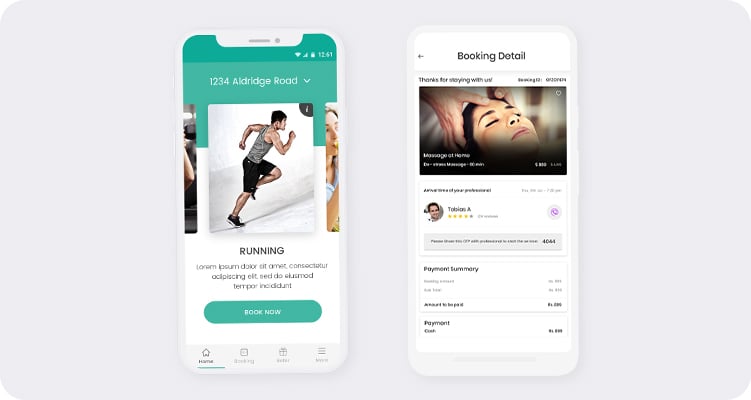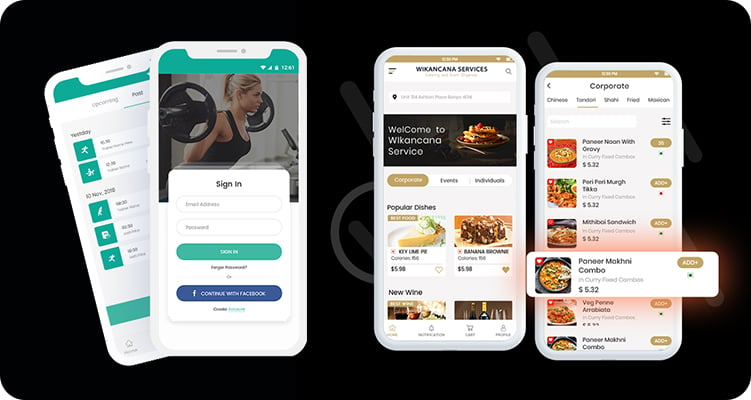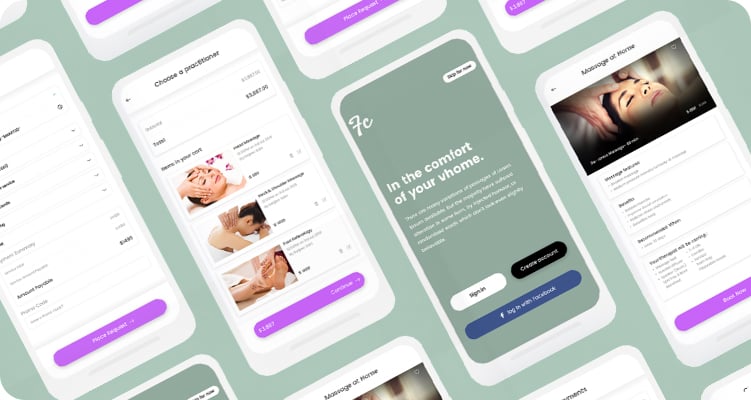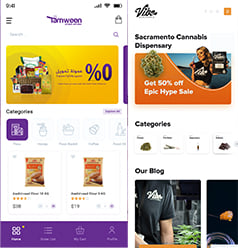
We Love to hear you back
Contact US
HR Department




.webp?width=732&height=428&name=image%20(39).webp)
The dynamic business tools for businesses today are mobile applications. These days, they have become the standard for connecting with customers for their daily requirements, such as banking, entertainment, grocery shopping, and more. Mobile applications are offering the provision for the prompt experience and convenience that users are searching for. And it is now possible with the help of hybrid app development services.
There is no doubt that businesses today depend more on apps. Therefore, the mobile app development industry is constantly rising, with the number of mobile apps downloads whopping 299 billion.
But, irrespective of how exciting this new idea of developing a mobile app for your business appears to be, it becomes a serious business impediment having its challenges. For instance, the cross-platform vs. native debate or when developing an app for a single platform is the best approach, or should you head out for the versatility of hybrid apps?
The entire decision depends mainly on several important factors, and our blog today aims to dive deeper into it. Let us now figure out the differences between the native and hybrid app, understanding which approach toward development is the right one for you.
.jpg?width=732&height=390&name=What%20are%20Native%20Apps%20(1).jpg)
Native app development involves structuring the apps with a distinctive programming language for the distinctive mobile Operating System like Swift and Android or Objective C for iOS. The app gets developed under the secured ecosystem to meet every technical expertise and protocol for user experience for the respective OS. It would make sure of rapid performances and a better experience.
Here, the experience would mean a consistent appearance and feel for the other native apps on this device. As an outcome, the end-user would learn how to use this app and navigate rapidly.
Alternatively, the native application has a few specific benefits as it is easily accessible and leverages the capabilities of the devices such as GPS, addresses book, camera, etc. The native apps appear native to the operating system, and therefore, these are generally built according to specific criteria.
It is time now to weigh the perks of native mobile apps against their drawbacks to help you understand what you will deal with if you decide to choose native app development.
The native app is mainly a refined version of the operating system's default application, as it often has an identical appearance and feels. It is the identity that improves the user experience.
The native apps generally load quickly as they are specifically created for this platform. They would enhance the graphics and image quality of the app by maintaining the aspect ratio.
They generally perform better, although they are not linked to the Internet, allowing you to use them without them. The general functions of these applications are accessed by the user even when they are left stranded in the middle of nowhere, like being on a plane or even a subway.
The native code is a lot quicker than HTML or JavaScript. Therefore, the performance of these native apps is quite good for graphic-intensive applications, apps, and HD games with heavier animation.
Native mobile apps generally take a longer time to download. The users must enter this app store while looking at the app as they open it, accept the terms and conditions, and eventually download it. If this entire process takes a lot of time, potential consumers might abandon the download midway through.
The cost of developing native apps would increase significantly as the native app developers come with varied skill sets required for creating, maintaining, and managing the same applications on every other platform.
It is extremely quick and simple to release identical features simultaneously across every platform. The main reason is that native mobile app have a distinctive codebase.
.jpg?width=732&height=390&name=What%20are%20Hybrid%20Apps%20(1).jpg)
When selecting the hybrid app development services, the experts only focus on the website. Hybrid apps are web applications that are developed using HTML and JavaScript wrapped in native app containers. While the users navigate these apps, it loads a lot of data on that specific page.
However, unlike the general web app, hybrid mobile apps use native plugins to accomplish native app-like functionalities without needing additional coding. The app can use the native features of the device, such as the camera, security features, and file storage like Face ID or fingerprint recognition. You can easily go through the native apps vs. the hybrid app vs. web app guide for better understanding.
Additionally, the cost for the hybrid app is much less compared to creating and maintaining a native app since the hybrid app developers are following the "write once, run anywhere" approach.
Hybrid app development comes with its strengths and weaknesses so let us check them out:
The hybrid apps have a "one for all" build that can save money and time while creating multiple versions of this application.
Hybrid apps can offer consistent and similar user experiences throughout the platforms for worse or better irrespective of whether the user is switching between different devices, browsers, or operating systems.
There is a single code base for almost every system; therefore, the Hybrid app developers should write them off at once and should operate whenever required. Every platform has its native apps, which should be developed, updated, and programmed separately.
These hybrid apps can achieve the same hardware-based performance acceleration as native apps. It is no longer a benefit since the native apps would perform the same thing; however, it is something that one should bear in mind.
Performance for different applications is almost the same whether native or Hybrid. Games in 3D or HD, software with data-intensive graphics, and other related performance-based apps are a few examples; however, they would never function adequately or consistently in the form of a hybrid app.
The app's user experience is unique due to the nature of the hybrid mobile apps. The operating system, the software they operate, and the versions will determine this. There is no longer any testing involved in preventing this.
The hybrid apps would need the native plugins, and a completely new device would have better functionality and would always become accessible like the native plugin. The skilled developer would create their own however it would increase the work amount and stress involved in this development process used by the hybrid mobile app development company.

Most individuals downloading applications from Google Play or App Store will not even understand the difference between a hybrid and a native app, and they hardly care about it. They only care about the end result, which is a responsive and efficient app for iOS or Android OS.
Knowing the key difference between the Hybrid and the native apps will allow you to pick the ideal approach, as this is how you can achieve this goal that matters for your company. Let us now check out a couple of factors to unveil the main reasons for picking one or the other development approach.
Regarding device access, native apps can access all device APIs through the platform SDK. Hybrid app users can access a limited number of APIs based on the tool.
The native apps can easily access almost every device's APIs through the SDK platform in terms of device access.
Native app development is costly since you must build apps across several platforms. , However, the hybrid apps cost quite less as they arrive with cross-platform compatibility.
The native app framework arrives with the original UI elements for the native appearance and feel. These hybrid apps will achieve a fairly native UI, but not accurately.
The developers for Java and/or Kotlin for Android and Swift/Objective-C for iOS are for native app development. The hybrid development uses Flutter, Cordova, Xamarin, React Native, NativeScript, etc.
The code base for the native mobile apps for a single platform is not working on the other platforms. On the contrary, the developers can start porting the codebase for the hybrid app across every platform.
The native apps are specifically highly complex to structure. Alternatively, hybrid mobile apps are moderately complex and simple.
The development of native apps offers high-end security measures. Compared to this, the apps are less secure comparatively.
Whenever a company is undertaking the stages involved in mobile app development, they wish to become a part of this competition, or they might have come across a better business opportunity. The executives are releasing the app earlier, irrespective of the reason. But, things done hastily would often lead to greater compromises. They've, and hybrid app development services are used to develop an app, but it is vital to know the process and assess the situation.
In this scenario, where the company is waiting for a couple of months to launch and build an app, the approach for native app development is the best. Undoubtedly, there is a great performance offering the highest security, and they are offering the best experience.
In the other circumstance, where the company needs to launch and deploy instantly, hybrid mobile app development is the perfect option. These apps are built directly under a single code released across different platforms, and it even takes comparatively less time and effort to hybrid mobile app development services.

The native apps are the rapid way as they directly work with the OS between the native and hybrid apps. On the other end, hybrid apps use the native wrapper and are, therefore, slower.
Therefore, whenever it comes to performance, nothing would match up with the native apps directly. The native apps are designed perfectly and are quite fast. The content, visual elements, and structures are already available on the phone for loading while navigating the app. Therefore, you can avail a seamless experience.
In comparison, only the wrapper for the hybrid app gets downloaded on the phone, which might not include the important navigational components. Several data get loaded directly from the server itself.
But, two issues might affect the app's performance: server and load balance requests. The best mobile app development company is opening, despite all the problems with hybrid applications lagging in their performance.
Mobile app development today is mainly regarding user experience, unlike in the past, and the key is to develop an app that does not appear like a new one. Anything appearing tough is quite frustrating.
Keep in mind that the users have struggled to adapt to their phones. The last thing they would expect is the uncanny app with unrealistic features since they can now handle their devices. They would expect the gestures, applications, interactions, and visual clues, which are impeccably integrated with the style guide of the platform.
The user experience for a mobile app is essential as the customers will have an adverse reaction towards the app. A few users would hardly use the app once more, and a few other users might switch to the other mobile app and offer a bad rating.
Knowing the trade-off for the user experience is vital whenever you pick between native and hybrid apps.
The native ones are OS-specific. As the company starts to build a new app, the specific user experience for that specific app will become important.
The platform should become agnostic while releasing a hybrid app. The single code base, UI is easier to develop and therefore consumes less time to hit this marketplace.

You can improve the app's performance and ensure successful mobile app development by picking the right technological stack, which consists of tools, programming languages, databases, frameworks, and so on. Alternatively, making the improper decision will result in specific unavoidable challenges skyrocketing the app development cost.
Let us now know about the tech stack you require for the native iOS and Android app development:
Native Android Apps
Java and Kotlin are the two main programming languages, and it is what the native app developers are choosing in terms of Android app development. Android Development tool and Android Studio are the best tools for automatic testing, code editing, and debugging.
Swift and Objective-C are the highly preferred programming languages for iOS app development. Regarding the App code, iOS native app development tools and Xcode will help you.
Standard web technologies like JavaScript, HTML5, and CSS are frequently used to create hybrid apps. The native and backend shell would make up the majority of these apps. The three frameworks the hybrid app developers frequently use for creating hybrid apps are Cordova, Ionic, and Sencha Touch 2.
Hybrid app development services are quite a resource and time-intensive process. Before you start investing your money in it, ensure that you are well-versed with the guide to application development and have a highly competent team of app developers who are on board to ensure the successful development of the key product.
The professional native add developer will excel in creating attractive and bug-free apps as they are well-versed in Swift, Objective C, Kotlin, and Java, along with the related OS and mobile devices. You need more developers to create native apps across varied platforms.
On the contrary, incorporating the features like push notifications, cameras, or GPS signals will deftly need hybrid app developers with in-depth technical know-how across varied devices. Furthermore, if you wish to create highly interactive user interfaces, UI and UX skills such as information, user persona, architecture, and wireframing are extremely helpful.
Across several situations, a Hybrid app is a better decision in several situations even though the native apps are stable and fast. There is no noticeable difference in the performance of the Hybrid and a native app if the app deals with not a higher amount of complex animations and web traffic. Hybrid apps are ideal if you have to deploy the app across several different platforms, with cost acting as the limiting factor.
The native apps are well-suited if they serve several people online or have complex effects and animations. In such cases, the native app will offer the best user experience as there is less lag and possible bugs than the Hybrid app. Therefore, if you need one with better performance without cost and time being the limiting factor, then native is the right option. So, if you are searching for the best Android app development services, then pick our experts, who will offer you the best solutions!


If you want to convert traffic into real leads, then optimizing the local search for your business is the ideal tool...
You should initially decide to pick a platform for operating your website if you plan on starting an online business...